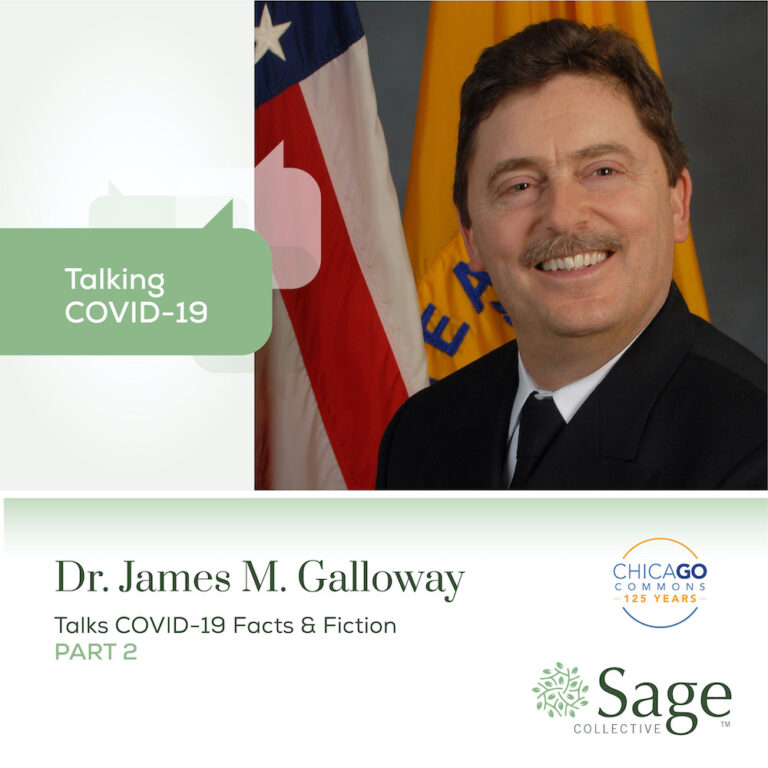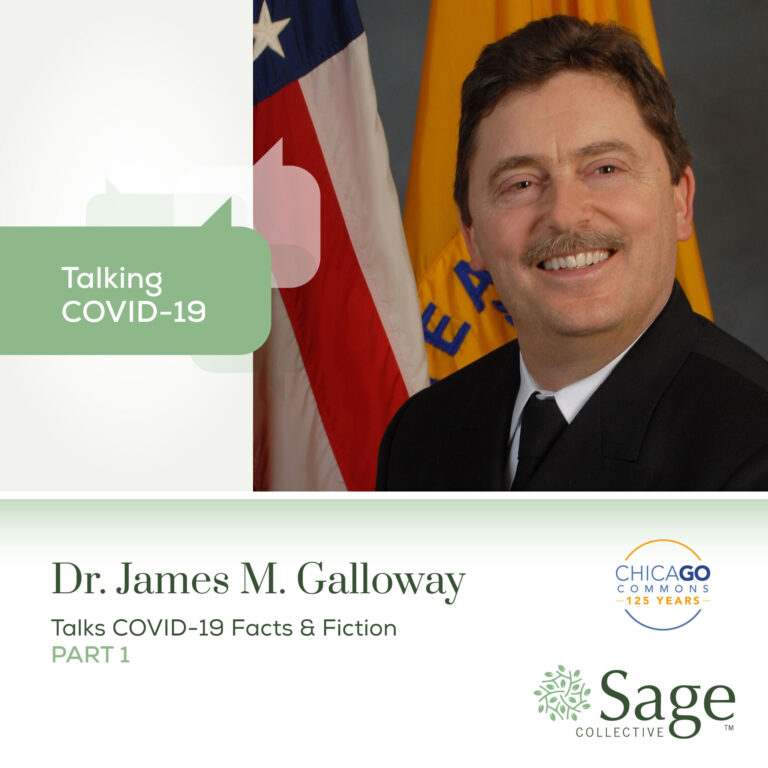Chicago Commons COVID-19 Live Q&A, Part 2
Sage Collective is thrilled to have recently partnered with Chicago Commons to bring a live, virtual Q&A event to their community of older adults. The purpose of the event was to address both facts and myths regarding the COVID-19 virus and vaccination.
The live Q&A session, which was part of Chicago Commons’ Adult Day Service (ADS) Program, featured questions from the audience, answered by Rear Admiral (Ret.) James M. Galloway, MD, FACP, FACC, with Monique Caradine serving as moderator.
You can read Part 1 of the Event Roundup here. In Part 2, Dr. Galloway tackles skepticism about the vaccine head on. With respect to the history of medical inequity in Black and Brown communities, and the distrust it has sowed, Dr. Galloway explains the safety of the vaccine and why it remains a critical solution to the ongoing pandemic.
MC: What would you say to those that are nervous about how quickly this vaccine was able to be developed? Usually, vaccine development takes several years, and this occurred over the course of just one year.
JG: Both Moderna and Pfizer are mRNA protein vaccines, and we’ve been working with this type of vaccine structure for decades. We already had a foundation in place before the need for this vaccination, so those developing the vaccine were able to rapidly ramp up the studies and production in a safe way with that knowledge already in place.
MC: Another question that came in from an attendee: what if I decide not to get vaccinated? Some people are considering this option based on what they’ve heard about the potential severity of side effects from the vaccination. Can you speak to that?
JG: Yes, I can. We’ve heard rumors about side effects of the vaccination. To be clear: the side effects of this vaccine are quite mild. You may experience soreness, swelling or redness in/on your arm where the vaccine was injected. Other mild side effects include headache, fever, muscle pain or nausea. But, it’s important to note that these side effects only last a few hours, if they even occur at all.
And despite the hype, serious side effects are very rare. The number of people who do have severe side effects is infinitesimally small, and those effects have been treated when they occur. Meanwhile, if you decide not to get vaccinated because of these concerns, let’s compare the risk of severe side effects to the risk of a severe COVID-19 infection: COVID-19 is causing severe infections and hospitalizations, and in the US alone, one death every 28 seconds!
The side effects of the vaccine are uncommon — and mild if they occur — compared to the severity of the impact of COVID-19 infection. Personally, I think that makes the value of the vaccine abundantly clear.
MC: There are many in the community that think, I’m young and I maintain a healthy lifestyle. Do I really need the vaccine?
DG: The lack of the vaccine, no matter how healthy you are, makes you much more susceptible to the virus. We’ve also seen that the virus can cause long term complications, even in young people, and we’ve seen the death toll. We also know that if you get it, you endanger all those around you — your family members, the folks who live in the home with you and any folks you come into contact with regularly. So there is, in both my mind and from the CDC’s perspective, no alternative that comes close to the protection of a vaccine.
MC: Another question from an audience member — a controversial one, which speaks to the distrust in the African American community around vaccines: How can I be sure that they are giving people in Black and Brown communities the actual COVID-19 vaccination?
JG: It’s a reasonable question, and one that underscores the longstanding issues of trust bred by historically racist and dangerous health policies, and clinical experiments in vulnerable Black and Brown communities. That history, combined with the current political perspectives swirling around, and some of the more chaotic messaging from multiple social media platforms and media outlets about the vaccine — of course there is distrust. It’s clear there is not a lot of trust in the medical profession or in healthcare in general.
I’d like to give you my perspective of the development and distribution of this vaccine. First and foremost, the vaccine is produced in large quantities and these manufacturing plants are under close supervision and control, without knowledge of where in which communities the vaccine is going to be distributed. So large lots of the vaccine are developed, and the vaccine is placed in small bottles which are sealed and shipped in bulk to states and cities, and these bottles are only opened when ready for use at the local level.
I myself have worked at a vaccine delivery site. When shipments are received, there are multiple individuals in a group overseeing the administration of the vaccine — from the pharmacist who oversees the opening of the containers, the calculation and measuring the dosages, the filling of the syringes and the actual administration of the vaccine. Many, many parties are in the area for safety concerns and traffic concerns.
I say this all to reassure you that it would be difficult for anyone to infiltrate the system and preferentially administer an ineffective or incorrect vaccine to any particular community or persons.
However, I will say, ensuring that the vaccine is distributed equitably between communities of color and white communities is a serious and real issue. With the data in place to backup these inequities, it is more important than ever for us to be outspoken and to work diligently with our local leaders in the arena of social justice and health equity in order to improve the fairness of distribution and ensure there is transparency around the process.
MC: In closing, where can people turn to for credible information and facts about the vaccine?
JG: CDC.gov is my number one, go-to place. Many public health directors at the state and local level go to the CDC for guidance and redistribute that information on their own websites as well. Certainly, your doctor or healthcare professional is also a good resource. Those would be my top three: the CDC, local governments and medical professionals.
And if you’re eager for more Q&A sessions on COVID-19 fact and fiction, Sage Collective is planning another event with Dr. Galloway, this time in conversation with Joseph West, PhD. Click here for more details and to RSVP.


